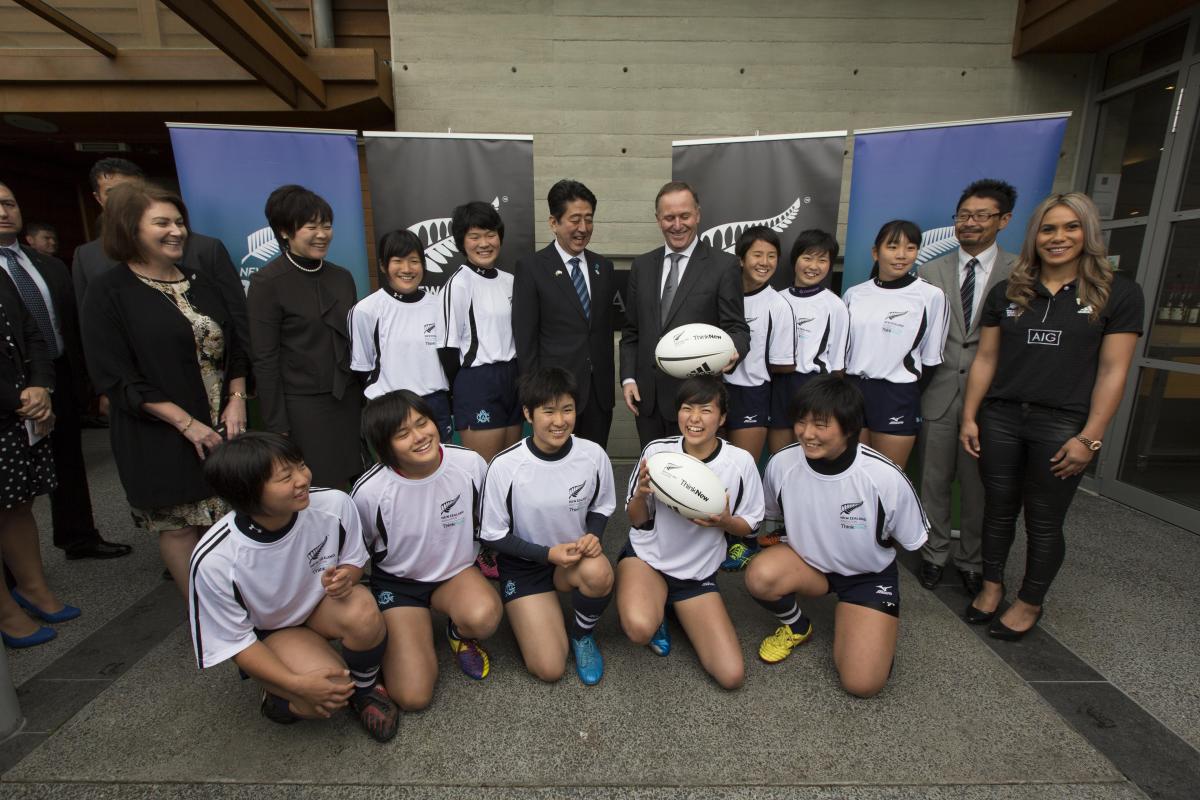10 July 2014 at 9:00 am
Game On English launched in style
New Zealand has teamed up its expertise in rugby and English language teaching to develop a new edu-sport programme for Japan.

New Zealand has teamed up its expertise in rugby and English language teaching to develop a new edu-sport programme for Japan in the lead up to the 2019 Rugby World Cup and the 2020 Summer Olympics.
On Monday 7 July Prime Minister John Key and Japanese Prime Minister Shinzo Abe launched Game On English in Auckland as part of Mr Abe's official visit to New Zealand.
The leaders threw a rugby ball to the programme’s inaugural students – Japan's national sevens female champions from Iwami Chisuikan High School – to kick off a rugby skills training session and officially launch the programme.
The Prime Ministers, current All Black Conrad Smith and Huriana Manuel, captain of the New Zealand women's sevens team and Black Fern, met and shook hands with each of the rugby players before they went through their training paces.
In the lead up to Japan hosting the Rugby World Cup and Summer Olympics Prime Minister Abe has announced a government goal to improve English language skills and increase sporting capacity amongst youth.
"As a country with an envious track record of developing the world’s best rugby players and a top quality education system, New Zealand is well placed to help the Japanese government meet their goal," says Grant McPherson, Chief Executive, Education New Zealand.
The Game On English programme matches English language providers with sports academies to deliver centrally-organised, bespoke courses for young athletes.
"Growing export revenue from international education is a key part of the Government’s Business Growth Agenda. Programmes such as Game On English are aligning New Zealand’s educational expertise with demand in the global market."
Japan is now the third largest source of international students to New Zealand.
"Our success as a country will be determined by our level of connectedness with the rest of the world. Education is one of the best ways to build international linkages.
"These students will act as ambassadors for New Zealand education promoting the quality of our education system when they return to Japan," says Mr McPherson.
The Iwami Chisuikan sevens team are studying English at the English Language Centre of Auckland Institute of Studies (AIS) in the morning and training with Auckland Rugby Academy in the afternoon for the month they are in New Zealand.
"New Zealand is very different from Japan, but the people here made it really easy for me to adapt and feel comfortable. I enjoy being able to communicate freely with people from different backgrounds in class, and the support we get from teachers is invaluable," says Iwami Chisuikan player Aoi Kurokawa.

"Kiwis train differently – they emphasise technique and make training fun. I would like to bring what I learned back to Japan."
Ran Aoki is also enjoying her rugby in New Zealand. "The best part of the programme is the training. Auckland Rugby make it fun and give invaluable comments and feedback."
"Kiwis value the quality of training in a given timeframe over accumulated hours which allows us to get the most out of our short stay in New Zealand.
"I learn English all around – in class, whilst training, and at home with my homestay family!"
In two weeks a second group of Game On English students will arrive from Japan.
Eleven secondary school players from Kanto Super League will be based in Dunedin - studying English at the University of Otago Language Centre and receiving rugby training from Otago Rugby Football Union and local Dunedin high schools.
Both groups of students are in New Zealand at the invitation of the New Zealand government to pilot the programme.
"It is our intention that Game on English will be rolled out nationally and New Zealand will support Japan in achieving their English language and sporting ambitions in the next five to six years and beyond," says Mr McPherson.
We will evaluate the pilot programme over the next month and advise the next step in due course.


